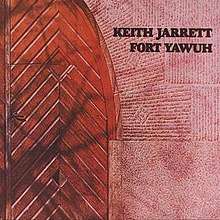Fort Yawuh
Fort Yawuh is an acoustic jazz album by American pianist and composer Keith Jarrett.[1] Originally released in 1973 by Impulse! Records, it features a live performance recorded at the Village Vanguard on February 24, 1973, by Jarrett, Dewey Redman, Charlie Haden, Paul Motian, and Danny Johnson. The title is an anagram of the phrase "Fourth Way."
| Fort Yawuh | ||||
|---|---|---|---|---|
 | ||||
| Live album by | ||||
| Released | 1973 | |||
| Recorded | February 24, 1973 | |||
| Venue | Village Vanguard in New York | |||
| Genre | Jazz | |||
| Length | 41:40 | |||
| Label | Impulse! | |||
| Producer | Ed Michel | |||
| Keith Jarrett chronology | ||||
| ||||
Background
At the time the recording was made, Danny Johnson had never worked as a professional musician. In an interview led by Ethan Iverson bassist Charlie Haden said that Johnson was "a great, great painter, and a great friend, and someone who was at EVERY gig, and one day he suddenly asked to sit in with us at the Village Vanguard. Keith asked, “What do you play?” “Triangle!” said Danny Johnson. Keith said yes and Danny came down with a big oriental rug and sat like a sitar player with his triangle. And that was the night we recorded Fort Yawuh."[2] One year later Johnson joined the group again on percussion (along Guilherme Franco) - this time for the studio recording of Treasure Island.[3]
Critical reception
| Review scores | |
|---|---|
| Source | Rating |
| AllMusic | |
| Christgau's Record Guide | A–[5] |
| Encyclopedia of Popular Music | |
| The Rolling Stone Jazz Record Guide | |
Reviewing for Creem in 1974, Robert Christgau said that, while side one sounds like cluttered free jazz at first, it is in fact highlighted by the Ornette Coleman-like playing of saxophonist Dewey Redman. He found side two more accessible because of drummer Paul Motian's performance during "De Drums" and the attractive composition of "Still Life Still Life".[1] In a retrospective review, Allmusic's Qa'id Jacobs wrote, "Fans of Jarrett's avant-garde liberalism will find 'De Drums' to be the track most unlike the other four selections on this album. 'Still Life, Still Life' is more like a ballad in that it's very slow, but it still maintains the structural freedom featured in the 'Fort Yawuh,' '(If the) Misfits (Wear It),' and 'Roads Traveled, Roads Veiled.'"[4]
Track listing
All compositions are written by Keith Jarrett.
Side One[8]
| No. | Title | Length |
|---|---|---|
| 1. | "(If the) Misfits (Wear It)" | 10:10 |
| 2. | "Fort Yawuh" | 10:55 |
| Total length: | 21:05 | |
Side Two
| No. | Title | Length |
|---|---|---|
| 1. | "De Drums" | 11:57 |
| 2. | "Still Life, Still Life" | 8:38 |
| Total length: | 20:35 | |
Extended Release
The CD box set The Impulse Years: 1973-1974 expands Fort Yawuh to two CDs, including unedited versions of the takes chosen for the LP as well as additional tracks.[9]
Disc One
| No. | Title | Length |
|---|---|---|
| 1. | "(If the) Misfits (Wear It)" (includes material not included in originally released version) | 12:58 |
| 2. | "Fort Yawuh" (includes material not included in originally released version) | 17:41 |
| 3. | "De Drums" | 11:53 |
| 4. | "Still Life, Still Life" | 8:37 |
| 5. | "(If The) Misfits (Wear It)" (previously unreleased) | 13:24 |
| Total length: | 64:33 | |
Disc Two
| No. | Title | Length |
|---|---|---|
| 1. | "Whistle Tune" (previously unreleased) | 2:29 |
| 2. | "Spoken Introduction" (previously unreleased) | 2:12 |
| 3. | "Angles (Without Edges)" (previously unreleased) | 14:17 |
| 4. | "Roads Traveled, Roads Veiled" (previously unreleased in this length; a shortened version of 9:30 has appeared in other reissues by Impulse!) | 20:25 |
| 5. | "De Drums (excerpt)" | 7:27 |
| 6. | "Melting The Ice" (previously unreleased) | 18:03 |
| Total length: | 64:53 | |
- All tracks were recorded at the Village Vanguard on February 24, 1973.
Personnel
- Keith Jarrett - piano, soprano saxophone, tambourine
- Dewey Redman - tenor saxophone, clarinet, musette, maracas
- Charlie Haden - bass
- Paul Motian - drums, percussion
- Danny Johnson - percussion
References
- Christgau, Robert (April 1974). "The Christgau Consumer Guide". Creem. Retrieved December 17, 2013.
- Ethan Iverson (March 2008). "Interview with Charlie Haden". Do The Math. Retrieved 18 November 2016.
- Jazz Discography Project. "Keith Jarrett Discography". Jazzdisco.org. Retrieved 19 November 2016.
- Jacobs, Q. Allmusic Review accessed September 12, 2011
- Christgau, Robert (1981). "Consumer Guide '70s: J". Christgau's Record Guide: Rock Albums of the Seventies. Ticknor & Fields. ISBN 089919026X. Retrieved February 27, 2019 – via robertchristgau.com.
- Larkin, Colin (2011). The Encyclopedia of Popular Music. Omnibus Press. ISBN 9780857125958. Retrieved 1 May 2019.
- Swenson, J., ed. (1985). The Rolling Stone Jazz Record Guide. USA: Random House/Rolling Stone. p. 112. ISBN 0-394-72643-X.
- Fort Yawuh at Discogs
- Fort Yawuh at Discogs